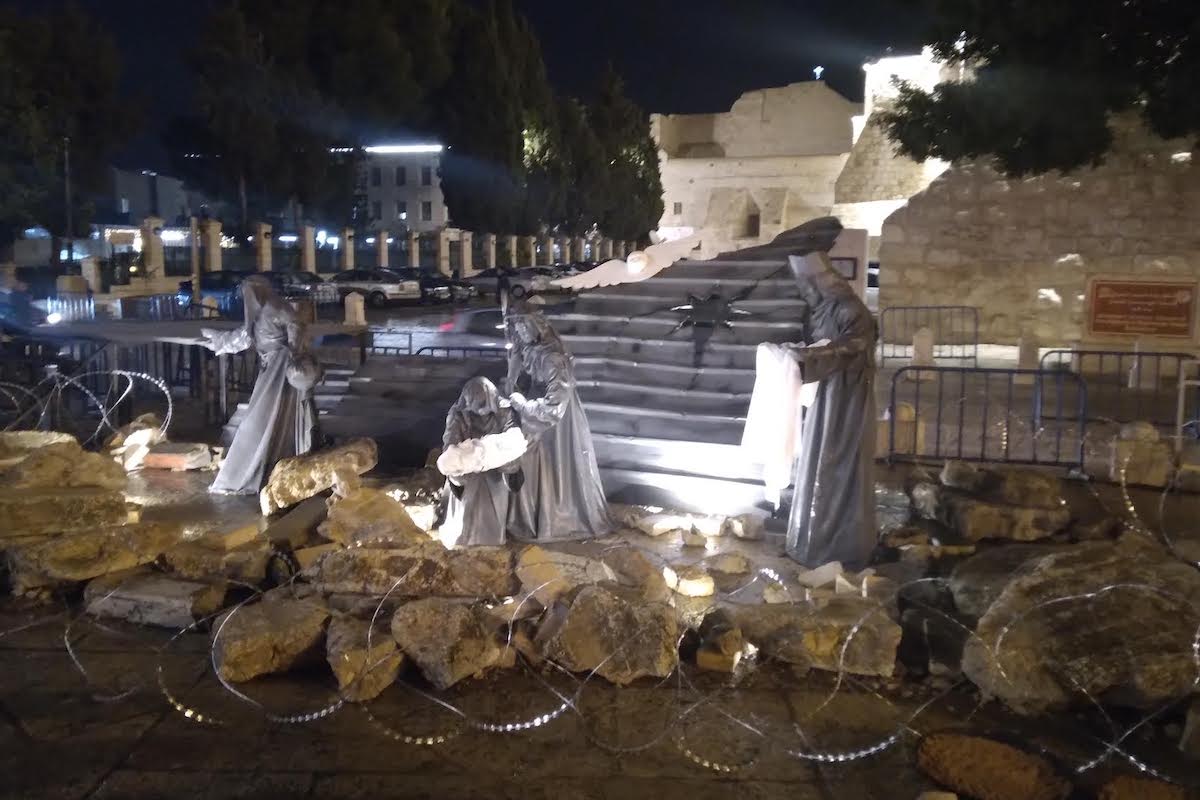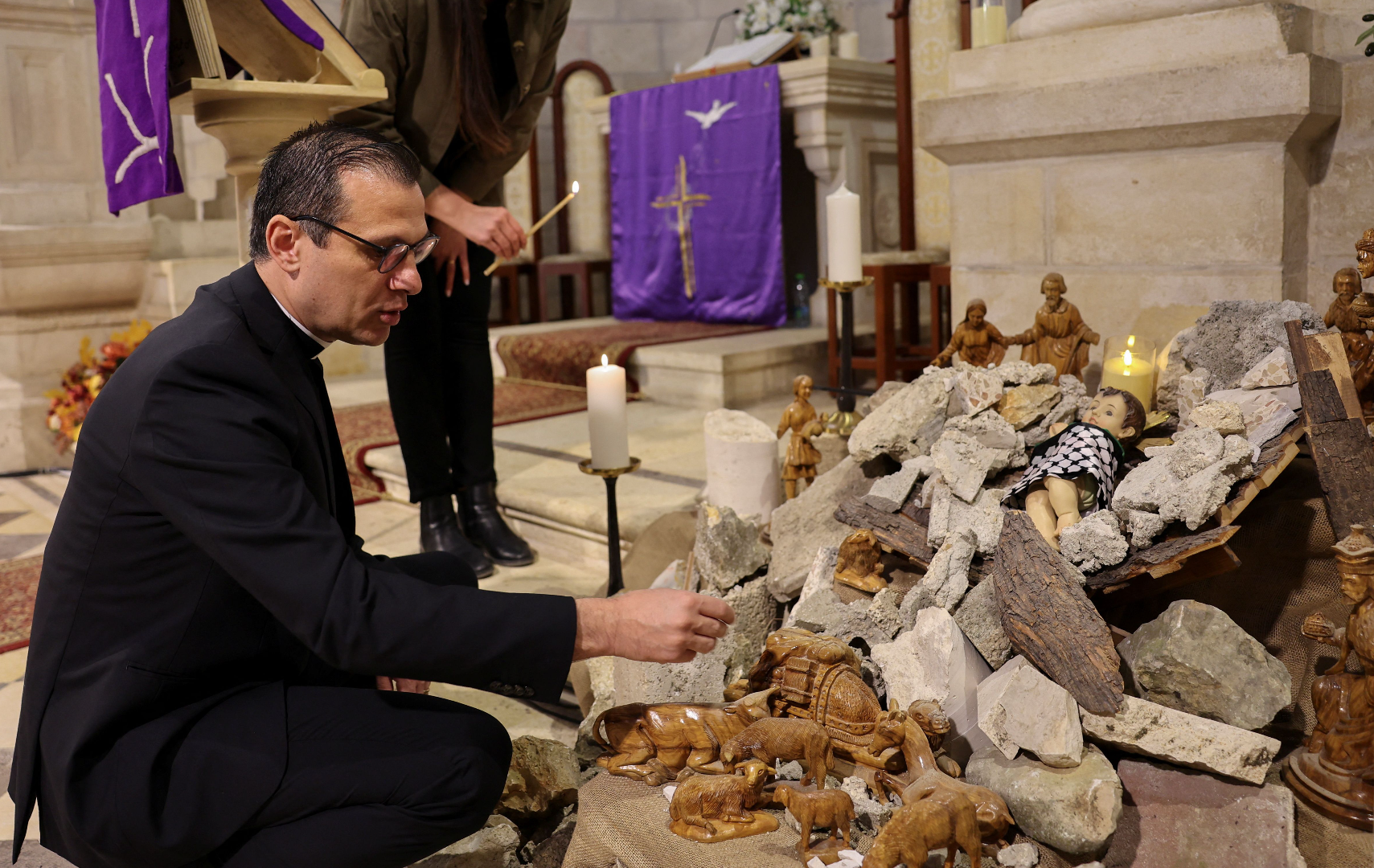'Christ at the Checkpoint' conference denies God's covenant promise to Israel
'Christian Palestinianism' reflects Palestinian Nationalism more Christianity

Even years on the calendar mark the arrival of possibly the most anti-Israel Christian conference in the world – "Christ at the Checkpoint" (CATC). Ironically, the event is hosted in Bethlehem, the very birthplace of the Jewish Messiah.
The biennial conference, sponsored by Bethlehem Bible College, took place in late May this year. The theme, for 2024, "Do Justice, Love Mercy," provided panel members an opportunity to give their perspective on what it means to be Christians during this specific war in Gaza; of course, with a healthy dose of denying God’s covenant promises to Israel and delegitimizing the modern state in the process.
The conference has been running since 2010 and while it is structured similarly to an academic symposium, in reality, it's a Palestinian Nationalist activism event. The lecture series is marketed to Evangelical Christians with the goal of providing an alternative to Christian Zionism, which the organization deems to be an unbiblical doctrine that contributes to discrimination against the Palestinian people.
This year, the conference drew approximately 250 social justice warriors from all over the world.
Dr. Paul Wilkinson, the foremost pro-Israel researcher on CATC calls this alternative movement, Christian Palestinianism. Consider this as juxtaposed with Christian Zionism, and the objective is fairly clear.
According to Wilkinson, the movement is “an inverted mirror image of Christian Zionism” and inherently “political, not biblical.”
At first glance, Evangelical Israel supporters can easily recognize traditional forms of "Supersessionism," the idea that the church is the true Israel, and replaces, fulfills or expands the covenants promised to Israel in the Bible. The problems with Christian Palestinianism, however, are much more extensive historically and theologically.

Even with nuanced presentations from speaker to speaker, CATC seminars work within a shared set of goals that ultimately seek to promote historical revisionism of Jewish/Arab relations. This is attempted through sharing highly emotional personal narratives, void of greater context and woven throughout theological discourse.
Persecution and human rights violations from Radical Islam and the Palestinian Authority (PA) are conveniently avoided. This leaves undiscerning observers with the sense that not only this current war but the entirety of the conflict is one between Israeli Jews and Palestinian Christians. The Christians in mention are not only 'victims' of Israel but also of the broader church, which has chosen to stand with Jewish Israelis – people of a different faith – over the suffering of Palestinian Christians.
The CATC conference director is Reverend Dr. Munther Isaac. Yes, the same Palestinian Christian leader who was hosted by Tucker Carlson in early April.
It was easily observed in the interview that the Bethlehem resident failed to condemn the Hamas terrorist organization for the atrocities of Oct. 7, and while he lives under the Islamic-influenced Palestinian Authority, he solely blamed Israel for the suffering of his people. He even expressed dismay at the lack of support Palestinian Christians receive from “Christian siblings” around the world.
This same position was his underlying message at this year’s CATC conference. During Isaac's keynote speech, he addressed the pain his people were suffering – as the world was watching – a “genocide" of the Palestinian people unfolding before their very eyes.
“And in our pain and anguish,” he said, “We as Palestinians… as Palestinian Christians, actually, had to endure an additional burden, the complicity of many in the church of this genocide.”
Of course, the use of this word “genocide” follows Hamas propaganda rather than the legal definition, and he supports this idea as valid through the use of the highly questionable Hamas-run Ministry of Health statistics.
Though the emotion behind his position is sincere, Isaac’s shock and rebuke of the church is based on a false dichotomy.
Evangelicals are not choosing between supporting a Jewish Israel, with a secular democracy, versus Palestinian Christians in the plight to establish a democratic state.
Rather the truth is that to stand with a Palestinian Nationalist movement, even presented under the guise of Christian language, is to stand with an Islamic government, one whose Basic Laws (their prototype constitution) state they will abide by Sharia Law, and one whose people currently are showing an 80% support base for Hamas as leadership. The end result would be a terrorist state bent on Israel's destruction.
Isaac, known to be openly hostile towards Israel, is the academic dean at Bethlehem Bible College. He also pastors the Evangelical Lutheran Christmas Church in Bethlehem. His church made news in December 2023 for depicting a nativity in which a “baby Jesus” was displayed in rubble, wearing a traditional Arab keffiyeh, the black and white patterned scarf that has become known as a symbol of Palestinian resistance.

Isaac spoke to this display and his accompanying sermon, "Christ Under the Rubble," in his address at the conference. It was a visual, he said, created by him “as a pastoral act” to “console” his people.
In speaking about solidarity with the marginalized and oppressed, he continued: “If Jesus would have been born in our land today, would he have entered our world in any other way today?”
Isaac believes this pastoral move was necessary to reclaim the honor and dignity of the lives of the people in Gaza.
The provocative visual of the nativity paired with the sermon, demonstrates the extent of the theological problems existing within broader Christian Palestinianism.
The nativity moved beyond traditional contextualization methods often used to bring cultural relevancy to the Gospel. Rather, it completely reinvented the incarnation, one of history’s most important events, and it did so on the foundation of a theology that reinvents Yeshua, Jesus.
What this means in reality is that Isaac, even if well intended, was not consoling his people with the truth of Messiah Yeshua, but rather a messianic figure made in their own image.
The theological framework that Isaac was speaking from is known as "Palestinian Liberation Theology" (PLT) – a method for interpreting scripture through the lens of the Palestinian experience. It was initially developed by an American-educated Israeli Arab, Dr. Naim Ateek, at The Sabeel Center for Ecumenism in East Jerusalem.
PLT finds its origins in Catholic Liberation Theology, which gained popularity in the 1970s. Under this original framework, the Bible was interpreted through the economic Marxist lens, using the axis of oppression and liberation of the poor as the general hermeneutic.
In "A Theology of Liberation," author Gustavo Gutiérrez focused on the impoverished people of Latin America. Over time, this concept was further developed, shifting away from economic to cultural Marxism. It was applied to issues of race through Black Liberation Theology, then to gender in Feminist Liberation Theology and, after that, acted as the basis for Queer Theology.
Whether economic or cultural, the axis remains with the two-class system – oppressed and oppressor – with the presumption that scripture is correctly read through the lens of the oppressed.
This is woke ideology repackaged in Christian language.
Most concerning about the outcome of this general hermeneutic is the direct way it changes the Gospel.
The truth that all have fallen short of the glory of God is absent or downplayed at best. The primary role of Yeshua, Jesus, is not to bring atonement for personal sin, but to liberate the oppressed. This deflects the need for personal salvation in favor of emphasizing a 'victim' identity.
Yeshua is downgraded from the Lamb who was slain, appeasing the wrath of God, to an overly empathetic cosmic superhero who rescues the disempowered from the powerful.
Dr. Ateek saw, in traditional Liberation Theology, a means of reinterpreting scripture such that Palestinians can reclaim the Bible, an idea that is actually self-refuting.
If it is necessary for the Bible to require reinterpretation in order to support Palestinian Nationalism, this speaks to a lack of biblical evidence for their position in a plain reading of scripture. Not only that, but it also testifies to the strength of the narrative of Israel’s restoration found throughout the whole of God’s word.
The inerrant and authoritative word of God has to be changed in meaning in order to support Palestinian goals. Such altering of scripture is common for all forms of Liberation Theology, but PLT seems to take it up a notch.
Feminist Liberation Theology, for example, seeks to change the identity of God into a feminine form. In PLT, the Jewish Messiah is oddly stripped of his Jewish identity. He is no longer a Judean but rather a Palestinian who suffered under the Roman Empire. From here, comparisons are drawn using contemporary language, between a "Roman Occupation" and Israel’s "Occupation" of Palestine.
Black Liberation Theology builds a narrative around the biblical Exodus account, relating to Israel’s freedom from slavery. This passage is too difficult to “de-Zionize,” so instead the story of Naboth’s vineyard from 1 Kings 21 is the foundational text for PLT.
In this case, Naboth represents the Palestinian people for his refusal to sell his ancestral land to King Ahab, who then represents Israel. As the story goes, after Naboth’s refusal, Jezebel manipulates the scenario and calls for Naboth to be stoned to death. As a consequence, Elijah prophesies the violent deaths of both Ahab and Jezebel.
PLT manipulates this passage such that Christian Palestinians look for God’s justice to fall upon Israel for repeatedly committing the sin of Ahab against their people, though Ateek attempts to temper this by calling for “justice with mercy.”
Other passages in scripture are contextualized, as well. Israel becomes Goliath and Palestinians become David, for example, in a move that is a very odd inversion of the story, given that "Palestine" is the Latinized form of Philistine, the very people David was fighting.
PLT has transcended its Reformation origins, expanding beyond its Catholic roots to gain support among Christians who embrace both Progressive and Replacement Theology.
PLT has crossed the bounds of the Reformation bringing this framework out of its Catholic origin, to a support base of Christians who have both Progressive and Replacement Theology leanings.
The speaker lineup at CATC often includes names like Hank Hanegraff, "The Bible Answer Man," a previously Evangelical leader who went down the path of Christian Palestinianism before converting to Eastern Orthodoxy.
Shane Claiborne and Tony Compolo, cofounders of "Red-Letter Christians," an organization dedicated to promoting social justice issues, have both frequented the platform in support of the Palestinian cause, as well.
Antisemitism and anti-Zionism will often make unlikely bedfellows of people who otherwise share opposing worldviews.
From a political perspective, Tucker Carlson is a case in point.
As a Paleo-Conservative, Carlson has been outspoken on leftist policy for most of his career. Interestingly, he made an exception for Isaac, the cultural Marxist pastor who frequently uses leftist terminology, admonishing the church to “speak truth to power,” or discussing Israel as a “colonizer,” an ”oppressor,” and an “apartheid state.” Christian Palestinianism is an expression of leftist identity politics that Carlson would be highly unlikely to tolerate in any other context.
The identity of Christian Palestinianism is more heavily weighted on the side of Palestinian Nationalism than that of being a Christian. Thus, there is a need to reinterpret scripture to align with nationalistic ideals.
That’s the greatest problem of this entire position and the CATC conference.
It's a process of changing the word of God to make themselves comfortable in standing against what we know to be prophetic fulfillment: The people of Israel returning to the land of Israel. It's a movement that would prefer to stand in solidarity with Islam than with a democratic Jewish state because of national identity. Even more so, the community surrounding the conference seeks to evangelize as many Christians into this doctrine as possible.
For the international church, where you fall on this war isn’t a choice between Jews and Palestinian Christians, as Christian Palestinianism claims.
This is a choice between Judeo-Christian values or Radical Islam. It's a choice between the true freedom found in the word of God rightly divided, or the bondage of bad theology.
We pray that the Rev. Dr. Munther Isaac will join us in such freedom.

Callie Mitchell has called Jerusalem home since 2009, where she has built a life as an immigrant family with her husband, four children and shetland sheepdog. She holds a Master of Architecture degree from the University of Cincinnati, along with a certificate in Christian Apologetics and training in Antisemitic Studies. She is the co-leader of the biggest, longest running ministry to moms in Jerusalem. She loves teaching, making art, baseball, dogs and horses. You can find her regular updates on Israel at her YouTube channel Callie Mitchel - I Will Not Keep Silent.
You might also like to read this:















